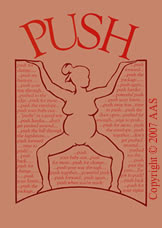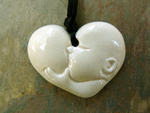crabgrass Says:
September 19, 2008 at
what really got to me was the way that the trailer was so focused on triggering the “protect” aspect of fatherhood/masculinity. there was a way that it was really working to appeal to this hyper-masculine idea of fatherhood. I don’t think the entire film will be more expansive, because I think that the baseline rationale for the film is that fathers need to be empowered (as manly men!) to step in and protect their wives and babies from the abuse of the medical system.
problematic, yet interesting.
Crabgrass:What really "gets to me" about the film is how rich and giving it is -- every one has sees and experiences it their different triggers and see that that is what it's about. Based on who they are and "where they are".
I hope you'll go to my blog, www.theothersideoftheglassthefilm.blogspot.com and www.hospitalbirthdebate.blogspot.com and read about why the film is for men and about men.
It is not at all about being manly men .. and it will expand beyond what one can imagine, beyond feminism. It has for me. It will look at what happens when men are able to heal their own primal wounding as baby boys -- born "under the influence of drugs" as were their mothers, "he cut me so bad" stories, separated and treated harshly by strangers, often women -- like the baby in the film who was brutalized by four strange women.
Most adult men --and only part of the male babies now - ere not breastfed, were brought to their mother on a schedule and cried in the nursery, and most often, their penis mutilated. This was often done by causing an erection. This is the story of most men over 25. Only episeotomy, breastfeeding and rooming in has truly changed significantly, Many babies are not circumcised, but there are still subjected to cord clamping before the placenta is birthed, and this suctioning for "meconium risk" that is now routine, despite the research showing there is no reason. NO reason. It makes no difference on meconium aspiration syndrome. 30% of all babies are born surgically. Circumcision is still done in a majority of cases.
There is a whole psychological phenomenon to be unfolded ... how it is that historically men whose innate need is to protect, yet they have taken us to war repeatedly, raped and pilfered, and until recently it was rarely a woman who would abuse a child sexually.
The men in the film were so the opposite of the hyper-masculine, manly men. They were vulnerable, tearful, speaking of their feelings that men rarely access -- helplessness, powerlessness, guilt, and shame. ALL of it related to THEIR experience of their babies births. ALL of them embracing their earliest parts in order to be better men, and one the ways they do so is to support their partner's biological and physiological needs in birth.
Most women, varied by many comments around the web, are totally unaware of their partners need to have their story heard, to have their perspective of the experience of birthing their child heard, felt, and acknowledged. Honored. It is not just women who experience the birth of their baby. And, when they can figure that out, they can "be with" their baby to tell his or her perspective of their birth. The baby has a story. The baby girl, and the baby boy. It starts there. It changes there.
The film is about healing the masculine, and doing so by being embraced as also wounded, by women. Women and men need to work together to heal the wounding of the feminine and the masculine.
It's about the phenomenon of how men - a Marine deployed to Iraq three times - can be giant in the world and yet be brought to his knees by a family physician and an obstetric nurse.
It is about the inner healing that creates gentle protectors -- it's about a man seeing his baby for the first time and what that means to him and to his baby and the baby-mama.
The father who pounded on the glass is one of those. His story, in full, is about how he gently, and powerfully, protected his daughter ... he was watching a circumcision when he pounded on the glass. When a LD deliver nurse insisted that he leave his wife and go to wait in the waiting room and he refused, and she began to push his chest, a 6'4" man, he simply, "Oh, no, I am not going anywhere" and their doctor happen to come by at that moment to "ok it." It is not a hyper-masculine perspective encouraging him and other fathers to fight for peace in the hospital. It is about the caregivers, mostly WOMEN not violating the man, usurping his power, and ignoring his wishes and plans for his family. It is about the caregivers honoring birth, protecting the father's experience so he can be present with his partner and baby.
You leave me with a pondering of how "protection" is equated with hyper-masculine and the "manly man.' When I am talkin' about women, mostly women, betrayers of women in the hyper-masculine, wounded masculine, overpowering, disempowering male-dominated system, acting like hyper-masculine women, manly women. For the pay check. Because they believe that they can achieve equality through work, career, and income. We're talking mothering here. Mothering the mother. Mothering the father. Fathering the mother. Fathering the father. Creating it.
Good information for me ... thanks so much for the post.








No comments:
Post a Comment